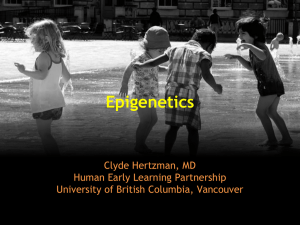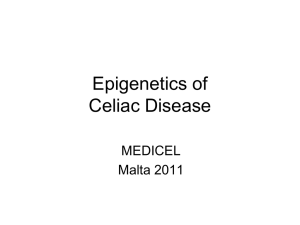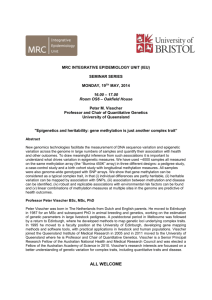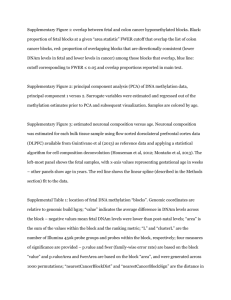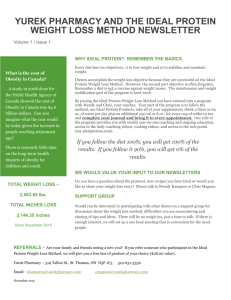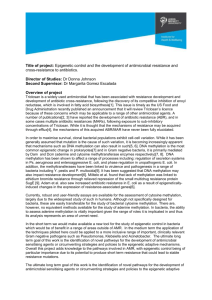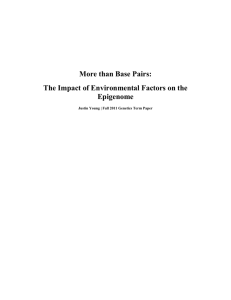Iftikhar Irraj Iftikhar Dr. Bert Ely Biology 303 1 November, 2013
advertisement
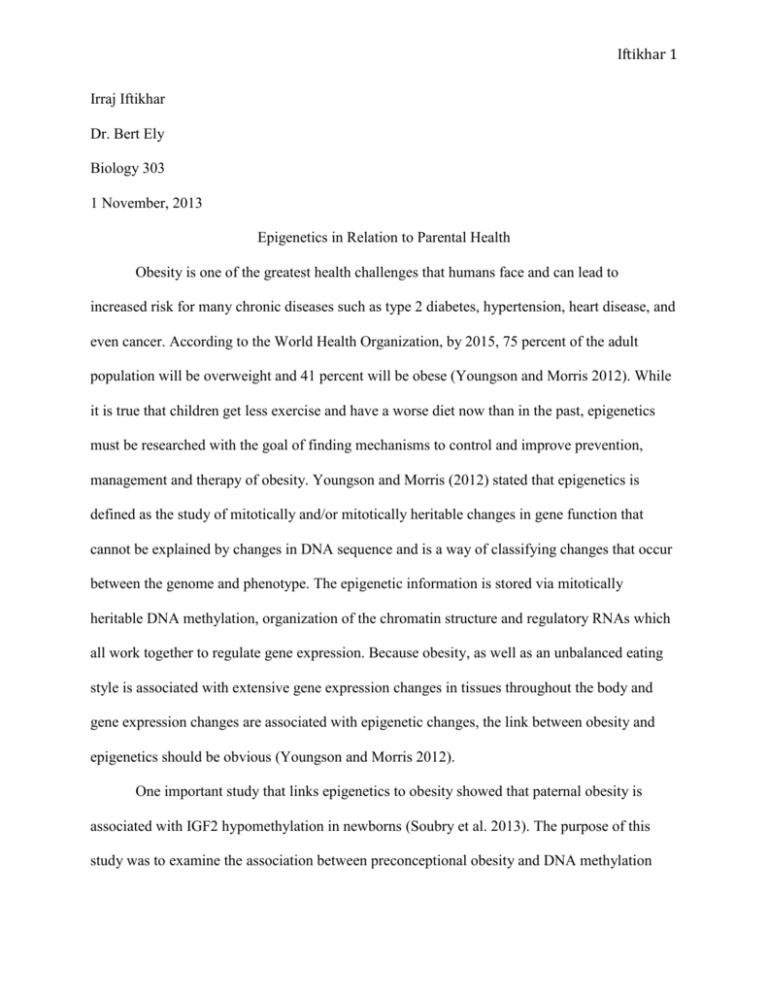
Iftikhar 1 Irraj Iftikhar Dr. Bert Ely Biology 303 1 November, 2013 Epigenetics in Relation to Parental Health Obesity is one of the greatest health challenges that humans face and can lead to increased risk for many chronic diseases such as type 2 diabetes, hypertension, heart disease, and even cancer. According to the World Health Organization, by 2015, 75 percent of the adult population will be overweight and 41 percent will be obese (Youngson and Morris 2012). While it is true that children get less exercise and have a worse diet now than in the past, epigenetics must be researched with the goal of finding mechanisms to control and improve prevention, management and therapy of obesity. Youngson and Morris (2012) stated that epigenetics is defined as the study of mitotically and/or mitotically heritable changes in gene function that cannot be explained by changes in DNA sequence and is a way of classifying changes that occur between the genome and phenotype. The epigenetic information is stored via mitotically heritable DNA methylation, organization of the chromatin structure and regulatory RNAs which all work together to regulate gene expression. Because obesity, as well as an unbalanced eating style is associated with extensive gene expression changes in tissues throughout the body and gene expression changes are associated with epigenetic changes, the link between obesity and epigenetics should be obvious (Youngson and Morris 2012). One important study that links epigenetics to obesity showed that paternal obesity is associated with IGF2 hypomethylation in newborns (Soubry et al. 2013). The purpose of this study was to examine the association between preconceptional obesity and DNA methylation Iftikhar 2 profiles in offspring, particularly at the differentially methylated regions (DMRs) of the imprinted Insulin-like Growth Factor 2 (IGF2) gene throughout embryogenesis and fetal growth. In imprinted genes, humans inherit only one working copy of a gene while the other is epigenetically silenced through the addition of methyl groups. Genomic imprinting occurs when the difference in gene activation is parent specific. The IGF2 and H19 genes are both very active during fetal development are examples of genomic imprinting. For the IGF2 gene, the copy that is inherited from the father is the active copy and for the H19 gene, the copy inherited from the mother is the active copy. Differences in levels of methylation can lead a loss or increase of activity in these regions which in turn leads to future health problems such as obesity. The study analyzed umbilical cord blood from 79 babies born in 2005 and 2006 and obtained parental characteristics such as those found in Table 1 via standardized questionnaires as well as medical records (Soubry et al. 2013). The cord blood samples were collected in a vacuum blood collection tube coated with K3EDTA, the genomic DNA extracted and a DNA methylation analysis test performed at two DMRs using pyrosequencing. Chi Square tests were used to compare obesity of the mother and the father within different sub- groups of pregnant women and if numbers were less than 5, the Fisher exact test was used. Multiple regression analyses were done separately for each exposure and characteristics from Table 1 and then used to predict DNA methylation at each DMR site. Obesity was defined as body mass index (BMI) ≥30 kg/m2. Figure 1 shows the graphs of the mean estimated methylation values at the insulin-like growth factor 2 (IGF2) and H19 DMRs in the offspring by obesity of the parents. There were no differences in methylation percentages at the IGF2 DMR between off- spring of obese and non-obese mothers and at the H19 DMR there were no methylation differences between offspring of obese and non-obese fathers (Soubry et al. Iftikhar 3 2013). There was however significantly lower methylation at the IGF2 DMR associated with paternal obesity, and significantly higher methylation at the H19 DMR when the mother was obese. This is one of the first reports in humans suggesting that paternal obesity may disrupt the normal establishment of genomic imprinting in germ cells and that the more than 2 months that it takes for sperm to mature is an important time of paternal influence. Obesity is not the only parental factor that affects a child’s health, what a mother eats when pregnant makes a difference in the health of the child as well. Keeping a balance between polyunsaturated fatty acid (PUFA) w-6 and w-3 is important in reducing the risk of obesity, diabetes, allergy, asthma and other diseases in offspring. Niculescu et al. (2012) uses a group of female mice split into two groups, one eating a control diet and the other a diet deficient in alpha-linolenic acid or ALA. This deficiency was created by replacing the type of fats in the diet but keeping the calories the same. When the females delivered their offspring, the groups were split again and half were given a diet rich in ALA while the other kept the same diet (Figure 2). The blood and liver were used to analyze the effects of restricting the amount of ALA on the offspring. Pyrosequencing DNA methylation assays were designed for the mouse fatty acid desaturase 2 (Fads2) gene. It was found that the diet rich in ALA created an increase in methylation of the Fads2 gene (Figure 3). Also, it was discovered that even with the diet rich in ALA, there was a correlation between the methylation of Fads2 in moms and in their offspring, which suggested that the offspring also inherit this methylation from their moms (Niculescu et al. 2012). This gives strong evidence that an unhealthy diet by a mom can create negative changes in the epigenetics of the offspring and can lead to problems such as chronic diseases for them in the future. Yet another study states that what a woman eats when she is pregnant and essentially Iftikhar 4 how healthy she keeps herself can have lasting effect on her offspring (Godfrey et al. 2011). Godfrey et al. (2011) reasoned that the targeted measurement of DNA methylation in human fetal tissues at birth might demonstrate the role of the prenatal environment in predisposition to adiposity, and this study was the first to show that maternal diet is linked to epigenetic changes in the child. The study was done in two separate parts, one with 78 women and the other with 239 women. In both, the women were given questionnaires to describe what they normally ate and the amount of key nutrients such as protein, fat and carbohydrates was determined. When the children were born, the researchers collected umbilical cord samples and analyzed them for areas with a lot of variation in the epigenetic pattern and compared the epigenetic patterns in the mother’s DNA in relation to the mothers’ diets. Genomic DNA was purified from frozen cords by proteinase K digestion and DNA methylation was measured. When the children were 9-years-old, the researchers measured the children’s weight and body fat and tested if epigenetic patterns in these areas were related to the children’s body fat measurements. Pyrosequencing analysis was done to exclude single nucleotide polymorphisms (SNPs) involving CpG dinucleotides, which would result in loss of potential for methylation. Variables were transformed using Fisher-Yates or logarithmic transformations where necessary to satisfy statistical assumptions of normality. To allow assessment of the influence of taking account of the child’s sex, exponentiated regression coefficients were first presented excluding and including adjustment for child's sex. Next, the CpG methylation at birth was related to the mother’s diet and to the child’s adiposity at age 9 (Table 2). It was determined that the changes at a location on the retinoid X receptor-α (RXR-α) gene were most strongly related to children’s body fat. The results indicated that low intake of carbohydrates by the mother lead to umbilical cord methylation in the PAH group (Figure 4). Also, the children’s percent fat Iftikhar 5 mass and fat mass at age 9 increased with higher umbilical cord methylation in the PAH group (Figure 5) (Godfrey et al. 2011). This study shows that the relation of parental health to epigenetics is indeed significant and shows how important it is for pregnant women to eat a balanced, nutritious diet for long-term benefits to her child. As all of the studies above show, epigenetics plays a big role in gene expression in offspring. The way that both parents take care of their body directly influences the way that their children’s bodies act. Whether it is obesity or simply eating an unbalanced diet, parents should be more careful in ensuring that when they are having a child, their health is the best possible to ensure that their child has the best health as well. Iftikhar 6 Table 1 Table 2 Iftikhar 7 Figure 1 Figure 2 2 Iftikhar 8 Figure 3 Figure 4 Figure 5 Iftikhar 9 Works Cited Godfrey, Keith M., Allan Sheppard, Peter D. Gluckman, Karen A. Lillycrop, Graham C. Burdge, Cameron McLean, Joanne Rodford, Joanne L. Slater-Jefferies, Emma Garratt, Sarah R. Crozier, B. S. Emerald, Catherine R. Gale, Hazel M. Inskip, Cyrus Cooper, and Mark A. Hanson. "Epigenetic Gene Promoter Methylation at Birth Is Associated With Child’s Later Adiposity." Diabetes 2011 May; 60(5): 1528–1534. Web. 25 Oct. 2013. <http://www.ncbi.nlm.nih.gov/pmc/articles/PMC3115550/>. Niculescu, Mihai D., Daniel S. Lupu, and Corneliu N. Craciunescu. "Perinatal Manipulation of αlinolenic Acid Intake Induces Epigenetic Changes in Maternal and Offspring Livers." The FASEB Journal 27 (2012): 350-58. NCBI. Web. 25 Oct. 2013. <http://www.ncbi.nlm.nih.gov/pubmed/22997227>. Soubry, Adelheid, Joellen M. Schildkraut, Amy Murtha, Frances Wang, Zhiqing Haung, Autumn Bernal, Joanne Kurtzberg, Randy L. Jirtle, Susan K. Murphy, and Catherine Hoyo. "Paternal Obesity Is Associated with IGF2 Hypomethylation in Newborns: Results from a Newborn Epigenetics Study (NEST) Cohort." BMC Medicine 11:29., 6 Feb. 2013. Web. 25 Oct. 2013. <http://www.biomedcentral.com/1741-7015/11/29>. Youngson, Neil A., and Margaret J. Morris. "What Obesity Research Tells Us about Epigenetic Mechanisms." N.p., 19 Nov. 2012. Web. 25 Oct. 2013. <http://rstb.royalsocietypublishing.org/content/368/1609/20110337.long>.
